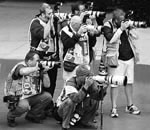Pers / Press
Terug naar overzicht
Sefarim.net English.

Gabor Por
24/04/2011 - It was a three to one mixed experience to read the book.
Kimpen: De Kabbalist (2007)
Posted by Gabor Por in New books, Reviews | No Comments
Since Geert Kimpen‘s De Kabbalist (The Kabbalist) was published in 2007 in Dutc it has been translated to several languages including German and Spanish. According to the author's website it "will" be published in English in 2009 in South East Asia, but the publisher's website is too barebone to find it and I couldn't locate any other information about the English edition. So I accepted my mother's offer to get me a copy. I read it the first chance I had, which happened to be sitting on the tarmac of Heathrow airport in London for four hours.
The book is a fictionalized biography of Hayyim Vital, a 16th century kabbalist. He was the student of Isaac Luria another Kabbalist luminary. The book's major theme is Vital's struggle for independence, from stepping out of the shadow of his master. His ambition was to be known as the most famous re-founder of Kabbalah, but the book suggests, that he was destined to be known only as the disciple of Luria, who would be known throughout the ages. Vital's biggest, recurring decision in the book had to be made between the greatness he longed for via Kabbalah and the love he felt for his master's daughter. We follow several years of his tormented life, until the pressure of making this decision cease to exist for a number of reasons, I won't spoil.
It was a three to one mixed experience to read the book. The positive aspects were the story, the style, and lessons. I kept finding myself surprised about the twists of Vital's life. I thought there is nothing more that can happen to him, but in the next chapter something unexpected popped up and gave him a new direction. I also kept wondering how much of it was made up by the author, and how much is historical fact. Based on m limited factchecking a surprisingly large portion of the events seem to be real. The second aspect I enjoyed was the author's and the translator's style. I cannot judge the original, but I think Tamas Balogh did a great job with the translation. There were only a few places, where I felt that the flow of the language wasn't the smoothest or where an expression seemed awkward. However the whole of the book was very much an enjoyable biography. The last positive aspect I want to mention was the integration of the novel with Kabbalistic teachings and principles. There weren't too many of the latter to overwhelm the reader, but there were enough of them to teach them some of the basics. Just right proportions for me.
